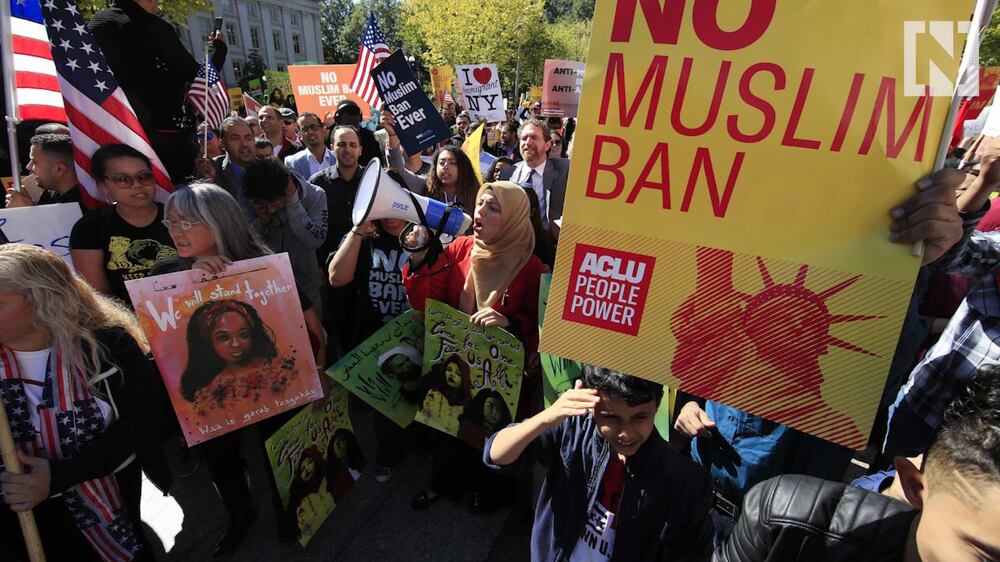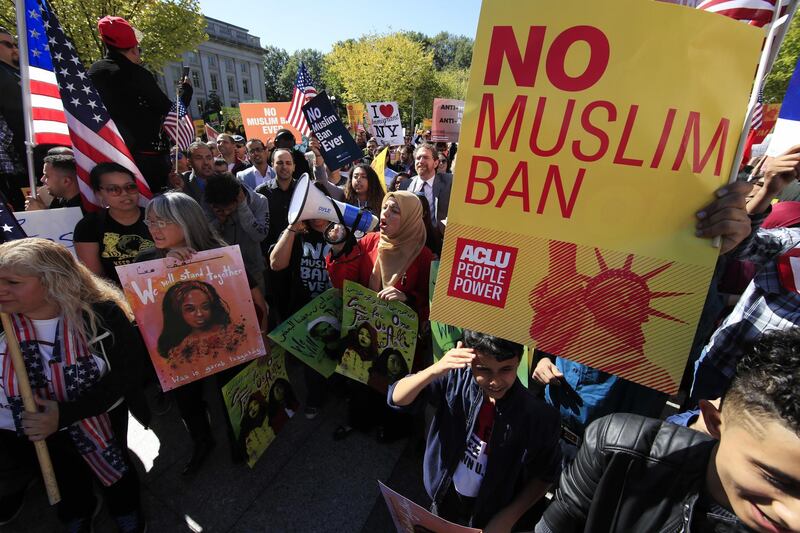The US Supreme Court on Monday allowed President Donald Trump’s third travel ban to take full effect, blocking the entry of travellers from six mainly Muslim countries while a string of legal challenges proceed through lower courts.
The decision was immediately hailed as a victory by Mr Trump’s supporters, who claimed it vindicated their belief the president had the right to set entry rules along the border.
It raises the immediate prospect of some overnight arrivals from Chad, Iran, Libya, Somalia, Syria and Yemen being sent home.
Critics accepted it was a defeat but countered that the decision was the result of a procedural issue and the legal battle would continue.
The American Civil Liberties Union said: “This is not a ruling on the merits, and we continue our fight. We are at the 4th circuit court of appeals on Friday to argue that the Muslim ban should ultimately be struck down.”
Mr Trump promised to ban Muslims from entering the US during the election campaign.
His proposal has suffered a series of defeats since he took power as judges in several courts have issued restraining orders to prevent it taking effect.
_______________
Read more:
[ White House asks US Supreme Court to allow full travel ban ]
[ One year after Trump victory, both country and president face huge challenges ]
_______________
The third version of the ban – covering arrivals from Syria, Libya, Iran, Yemen, Chad, Somalia, North Korea and Venezuela – was due to go into force in mid-October.
Major elements were blocked at the eleventh hour by judges in Maryland and Hawaii, while the legal challenges – covering the president’s right to control border security and whether the bans discriminated against Muslim – continued. They said “foreign nationals who have a credible claim of a bona fide relationship with a person or entity in the United States”, such as grandparents, grandchildren aunts, uncles, nieces, nephews and cousins, could not be barred.
The judges decided that Mr Trump’s statements and tweets, before and after the election, were evidence the ban was motivated by “religious animus”.
The Trump administration appealed to the Supreme Court to set aside the injunction.
US Supreme Court backs Trump’s travel ban on six Muslim countries

In his submission, Noel Francisco, the solicitor general, argued that the third version of the executive order did not cover the vast majority of Muslim nations. It was the result, he said, of a careful review conducted by multiple government agencies based on security concerns.
“Based on that review, the proclamation adopts tailored entry restrictions to address extensive findings that a handful of particular foreign governments have deficient information-sharing and identity management practices, or other risk factors,” he wrote.
Lawyers for the state of Hawaii argued that the president had overreached his authority.
“Most importantly, the President’s third travel ban, like his first and his second, is irreconcilable with the immigration laws and the Constitution. It openly ‘discriminates because of nationality’ in the teeth of an unambiguous statutory prohibition,” they wrote.
However, the court, with two of the nine justices dissenting, sided with Mr Trump’s administration and its request to lift the injunctions.
The decision blocks entry of all travellers from Syria while those from other countries using certain visas will be barred.
Although the challenges to the ban continue to make their way through the lower courts, Margo Schlanger, a University of Michigan Law School professor, said the decision was an ominous sign of where the final result would end.
“It suggests that the Supreme Court is more sympathetic to the government than the prior orders suggested,” she said.
“I think the courts of appeal were doing it right. I think it would have been more appropriate to deny this stay. But there’s still a battle to fight.”
She added that the proclamation was framed in terms of entry restrictions, which meant there could be people in the air affected by the ban coming into force.
A spokesman for the White House said he was not surprised by the outcome.
And the head of the campaign for Mr Trump’s re-election, Michael Glassner, said it emphasised the president’s commitment to keeping Americans safe.
"All Americans should take heart that President Trump is fully committed to making America safe again, and will continue the fight to ensure their safety no matter what,” he said.
Muslim and immigrant advocacy groups condemned the decision.
“It is entirely unacceptable and un-American to discriminate against people based on race or religion,” said Steven Choi, executive director of the New York Immigration Coalition. “Allowing the full enforcement of the Muslim ban will not make this country safer or greater.
“Nearly a year after we rallied at JFK in response to the first Muslim ban, we will continue to fight Trump’s plan to turn bigotry into policy and resist this latest assault on our liberties just as we have every day since Trump took office.”






